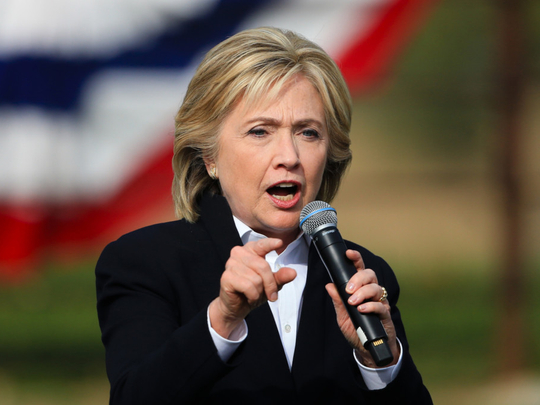
Another week, another cave from Hillary Clinton. The Democratic front-runner came out against the Trans-Pacific Partnership (TPP) trade deal last week, a pact she pushed for when she was secretary of state. The question is not whether she’s pandering but how negative the real-world consequences of her pandering will be.
Hillary seems keenly sensitive to that question. She has been carefully calibrating her pandering, keeping her options open and the stakes as low as possible — and often without granting that activists’ ideas even make sense. Because they often don’t, and she almost certainly knows that.
The TPP is only the latest example. Though Hillary talked up the treaty when she ran the State Department, she announced last week that the agreement doesn’t meet the “high bar I have set” for trade deals. Yet the TPP may well be off the docket by January 2017, when she would be inaugurated if elected president. Even if it’s not, she hasn’t adopted the anti-trade hyperbole of others in the race. This leaves her rhetorical space to favor a “modified” TPP or other future trade deals that, she can argue, do meet her standards. Moreover, she put off announcing her opposition until after Congress voted to give United States President Barack Obama fast-track trade authority, reducing the likelihood that what she says will make any difference to the treaty’s final outcome.
Then there’s Hillary’s positioning on the Keystone XL oil pipeline. Environmental activists have made a mountain out of this climate molehill, turning what should have been a relatively inconsequential infrastructure approval process into a protracted political battle. Years ago, before the debate had intensified, Hillary signaled that she was inclined to approve the pipeline because it wouldn’t seriously contribute to climate change. Last month, she came out against the project - but she still didn’t give any credence to the argument that its approval would be a major blow to the climate. She merely argued that the proposed pipeline had become a “distraction” and that the country needed to “move beyond it.” In other words, opposing the pipeline is a reasonable price to pay in order to eliminate the question and get to the right choices on issues that really matter. Not coincidentally, Hillary released a workmanlike energy infrastructure plan right after announcing opposition to Keystone XL, focusing on modernizing leaky pipelines, reducing oil train derailments and building on the carbon dioxide markets forming in various places - not on rejecting oil or gas infrastructure.
Hillary also gave in last month on Obamacare’s “Cadillac tax,” a charge on generous employer-sponsored health-care plans, which currently enjoy favorable tax status, that is meant to discourage over-spending on health-care services. The Cadillac tax is perhaps the most potent cost-containment mechanism in Obamacare, which is why unions don’t like it: They want to keep their handsome benefits packages, even if it means, in effect, using public subsidies to drive up unnecessary health-care costs. Even though even liberal economists back the Cadillac tax, Hillary surrendered to union pressure last month, saying that she favors repealing it. But she added a big caveat: Congress would have to find some way to replace the revenue that the tax would raise, which is necessary to fund Obamacare’s health-coverage expansion.
Once again, she seems to be pandering to an element of the base in a way that’s relatively costless in policy terms. It’s unlikely Congress would make up that $87 billion (Dh319.9 billion). If she wouldn’t get rid of the Cadillac tax absent a reasonable budget offset, it’s a good bet that the tax’s revenues and cost-containment would stay in place.
But Hillary’s approach to pandering isn’t totally costless.
First, there are the effects on Hillary’s image: Even if you believe she is making the inevitable compromises necessary to succeed in politics, Hillary can’t pull them off without looking cynical, including to the people she’s trying to placate.
More importantly, just because it’s unlikely that Congress would come up with $87 billion to repeal the Cadillac tax doesn’t mean it’s impossible; at least some lawmakers in both parties seem determined to get rid of the tax. What excuse would Hillary have to refuse if they got a fully-funded repeal bill passed? On the TPP, meanwhile, the fact that all the major Democratic presidential candidates now oppose the trade deal could make it more difficult for Democrats in Congress to vote for it.
And, though Hillary seems to be optimising her pandering to be relatively inconsequential, she’s still indulging activists’ illogic rather than challenging orthodoxies she probably doesn’t buy into — and, indeed, shouldn’t. At the least, that sets several bad precedents: Showing she can be pushed into interest group-driven decision-making, entrenching orthodoxies that should be resisted and encouraging activists and interests to demand more policy concessions in the future — even if they prove to be “distractions” from what Hillary really wants to do.
— Washington Post










